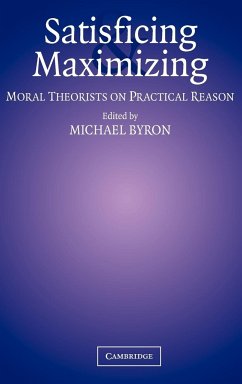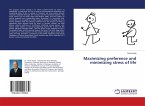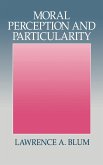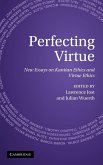Short description/annotation
A collection of essays on two different accounts of practical reason.
Main description
How do we think about what we plan to do(?)33; One dominant answer is that we select the best possible option available. However, a growing number of philosophers would offer a different answer: since we are not equipped to maximize we often choose the next best alternative, one that is no more than satisfactory. This strategy choice is called satisficing (a term coined by the economist Herb Simon). This new collection of essays explores both these accounts of practical reason, examining the consequences for adopting one or the other for moral theory in general and the theory of practical rationality in particular. It aims to address a constituency larger than contemporary moral philosophers and bring these questions to the attention of those interested in the applications of decision theory in economics, psychology and political science.
Table of contents:
Introduction Michael Byron; 1. Two views of satisficing Michael Slote; 2. Satisficing as a humanly rational strategy David Schmidtz; 3. Maxificing: life on a budget; or, if you would maximize, then satisfice Jan Narveson; 4. Satisficing and substantive values Thomas Hurka; 5. A new defense of satisficing Michael Weber; 6. Satisficing: Not good enough Henry S. Richardson; 7. Why ethical satisficing makes sense and rational satisficing doesn't James Dreier; 8. The plausibility of satisficing and the role of good in ordinary thought Mark van Roojen; 9. Satisficing and perfectionism in virtue ethics Christine Swanton; 10. Could Aristotle satisfice(?)33; Michael Byron; 11. How do economists think about rationality(?)33; Tyler Cowen.
Hinweis: Dieser Artikel kann nur an eine deutsche Lieferadresse ausgeliefert werden.
A collection of essays on two different accounts of practical reason.
Main description
How do we think about what we plan to do(?)33; One dominant answer is that we select the best possible option available. However, a growing number of philosophers would offer a different answer: since we are not equipped to maximize we often choose the next best alternative, one that is no more than satisfactory. This strategy choice is called satisficing (a term coined by the economist Herb Simon). This new collection of essays explores both these accounts of practical reason, examining the consequences for adopting one or the other for moral theory in general and the theory of practical rationality in particular. It aims to address a constituency larger than contemporary moral philosophers and bring these questions to the attention of those interested in the applications of decision theory in economics, psychology and political science.
Table of contents:
Introduction Michael Byron; 1. Two views of satisficing Michael Slote; 2. Satisficing as a humanly rational strategy David Schmidtz; 3. Maxificing: life on a budget; or, if you would maximize, then satisfice Jan Narveson; 4. Satisficing and substantive values Thomas Hurka; 5. A new defense of satisficing Michael Weber; 6. Satisficing: Not good enough Henry S. Richardson; 7. Why ethical satisficing makes sense and rational satisficing doesn't James Dreier; 8. The plausibility of satisficing and the role of good in ordinary thought Mark van Roojen; 9. Satisficing and perfectionism in virtue ethics Christine Swanton; 10. Could Aristotle satisfice(?)33; Michael Byron; 11. How do economists think about rationality(?)33; Tyler Cowen.
Hinweis: Dieser Artikel kann nur an eine deutsche Lieferadresse ausgeliefert werden.








